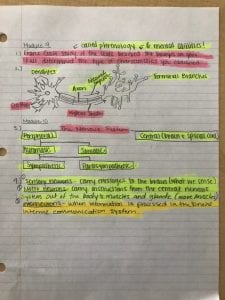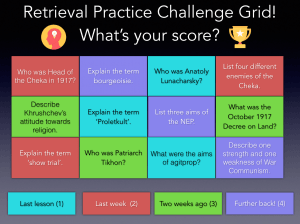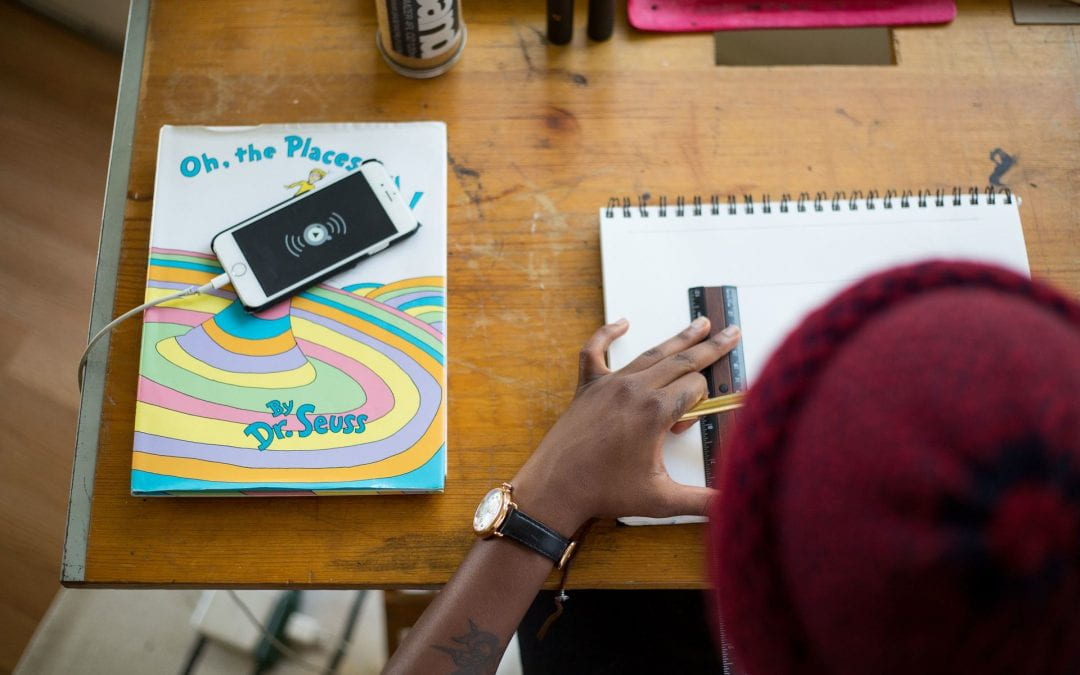In February 2019, the TILE Network welcomed Dr Flávia Schechtman Belham to speak on the topic of ‘Why don’t students use effective learning strategies’. As the Chief Scientist at Seneca, a free homework and revision platform for KS3, GCSE and A-levels, Flávia applies cognitive research to real-life education. With this experience in mind, Flávia offered unique insight into not only why students struggle to use effective learning strategies, but also speculations and tried methods on how to overcome this predicament. In this reflection, I will try to recap the most important ideas and then offer the perspective of a student at university on this matter.
Flávia’s talk centred around four evidence-based learning strategies that are most prominent in cognitive literature:
- Dual Coding: combining words and visuals
- Spaced Practice: spacing out studying over time, opposite of cramming
- Interleaving: switching between ideas while studying
- Retrieval Practice: practicing bringing information to mind
For more information on these specific strategies for both teachers and students, I recommend learningscientists.org as a resource.
Learningscientists.org is only of many resources offering in-depth information about learning strategies to teachers as well as students. If interested, the resources Flávia identified can be found below.
Resources for Learning Strategies
She also mentions Twitter and the CogSciSci Mailing list (for which you can sign up here) as resources to actively interact with other researchers, educators and experts in the field.
However, despite these resources available, only 1 in 4 students will use effective learning strategies, as one of Seneca Learning’s surveys shows, which is further supported by research showing that the vast majority of students are not using effective learning strategies and rather than using spaced practice, they cram right before the exam and then do not concern themselves with the material again (Kornell & Bjork, 2007), and that instead of using retrieval practice, simply restudying the material was the most popular learning strategy (Karpicke & Roediger, 2009).
The issue therefore is not that there is no evidence and research on effective learning available, but rather that students do not do not make use of them.
Why don’t students use effective learning strategies? Back to the original question of the talk, Flávia offers three evidence-based explanations as to why students are not using effective learning strategies.
- Unawareness
(Karpicke & Roediger, 2009) show that if student use recall when studying, this is usually to assess how much they have learnt (assessment of learning), and not to actively study more (assessment for learning). This shows student’s unawareness of the effectiveness of retrieval practice. - Illusions of competence
Koriat & Bjork, 2005 identified overestimation of future performance as one of the issues for not using effective learning strategies, as with most study techniques like rereading and restudying the material, judgement of learning happens when the answer is present, leading to an illusion of competence. This makes it seem like restudying the material is an effective learning strategy, although it will not translate into exam conditions when students have to freely recall the answer. When quizzing themselves aka using retrieval practice, estimate of future performance is accurate, but lower, making students think that quizzing is less effective than rereading the material. If interested, a classic example for illusion of competence can be found in Kornell and Son’s (2009) study. - Too much effort and time
Flávia also suggests that, for students, using the previously-mentioned learning strategies will require a lot of effort and time that they might not have when studying several subjects at once in school. This time and effort would seem especially futile if student’s own judgement of learning is telling them that other study techniques such as rereading a more effective.- Spaced practice requires a study plan across weeks, while simply studying for the next exam when it is coming up, i.e. cramming, requires less effort.
- Creating mind maps, based on dual-coding, takes more time and effort than simply writing a summary of the to-be-studied material.
- Creating and answering questions to do retrieval practice takes more effort and time than simply rereading the material.
How do we overcome these 3 problems that seem to keep students from using effective learning strategies?
Unawareness is the easiest to battle from these 3 problems: Flávia suggests to explicity teach these strategies through assemblies, parent-teacher evenings and possibly, with older students, classes about the brain and memory that show the effectiveness of these strategies. Key is to provide evidence, and with help of good online resources such as ‘How To Study For Exams – Evidence-Based Revision Tips’ by Ali Abdaal, students have the opportunity to learn from other students.
To facilitate student’s use of these learning strategies, making time and effort less of an issue, Flávia suggests using tools that apply these learning strategies in the classroom, such as methods by Blake Havard, Kate Jones and Adam Boxer.
 Blake Havard suggests colour coding recall attempts to assess learning: Students write down what they know about a topic without the help of books or other students, and then mark this in a specific colour. This helps students be aware of their current knowledge, providing accurate judgement of learning. Then, in a second attempt, students can use their notes to fill in the blanks, which they will then highlight in a different colour. This will bring awareness to the effectiveness of student’s notes, and whether they are sufficient for further studying. In a third attempt, students can now discuss answers with other students and mark what they have gained or changed again in a different colour. This can be done over several weeks, and as it involves metacognition, hopefully also improves student’s judgement of learning while engaging in spaced and retrieval practice. Further information on this topic can be found here.
Blake Havard suggests colour coding recall attempts to assess learning: Students write down what they know about a topic without the help of books or other students, and then mark this in a specific colour. This helps students be aware of their current knowledge, providing accurate judgement of learning. Then, in a second attempt, students can use their notes to fill in the blanks, which they will then highlight in a different colour. This will bring awareness to the effectiveness of student’s notes, and whether they are sufficient for further studying. In a third attempt, students can now discuss answers with other students and mark what they have gained or changed again in a different colour. This can be done over several weeks, and as it involves metacognition, hopefully also improves student’s judgement of learning while engaging in spaced and retrieval practice. Further information on this topic can be found here.
 Kate Jones provided twitter with her idea of a retrieval practice challenge grid, creating a championship with her students. The grid offers questions from the last lesson, last week, two weeks ago and further back. The further back students are able to remember the answer, the more points they will gain. This method engages students in a motivating way, while practicing interleaving, spaced practice and retrieval practice and can be done for each lesson. Further information about the retrieval practice challenge grid can be found here.
Kate Jones provided twitter with her idea of a retrieval practice challenge grid, creating a championship with her students. The grid offers questions from the last lesson, last week, two weeks ago and further back. The further back students are able to remember the answer, the more points they will gain. This method engages students in a motivating way, while practicing interleaving, spaced practice and retrieval practice and can be done for each lesson. Further information about the retrieval practice challenge grid can be found here.
Adam Boxer created a simple excel program for his students as a way to practice retrieval and spaced learning, calling it retrieval roulette. At the beginning of the course, each student received a document pertaining core questions and their answers, as well which topic the questions belong to. For lessons, excel generates a quiz with 10 random questions based on the document, for example 5 relating to the current topic and 5 relating to older material. Further information can be found here, in which a compilation of different topics using this retrieval roulette can be found here.
As Flávia herself works for a free homework and revision platform, Seneca Learning, she showed that it also uses retrieval practice, spaced practice with interleaving and dual coding. It also offers automated marking and adapted learning while being completely free for students. However, Seneca is currently not available in Scotland.
This concluded Flávia’s talk about why students do not use effective learning strategies. Shining light on the causes of this predicament provides opportunity to actively combat this problem, for example with the previously-mentioned methods that teachers developed, used succesfully and shared. However, as Dr Carolina Kuepper-Tetzel, our founder, rightly mentioned after the talk, one issue behind student’s study habits might be their goal to pass instead of their goal to learn. If the motivation behind studying is getting a good grade, cramming might provide a more effective strategy than spaced practice, as previous research shows. Therefore, while it is fantastic and crucial to have access to methods to better student’s learning, the focus on grades might also be worth considering as a further cause for student’s learning habits.
As a third-year psychology student, I only have learned about effective learning strategies a year ago, when Carolina taught lectures about the fundamentals of human learning in year 2. While I use retrieval practice and dual coding during studying, and usually see great results from it, I personally struggle to engage in spaced practice, mostly due to the time and effort it requires, attesting to Flávia’s suggestion that this is one the reasons students fail to use effective learning strategies. This made me ask Flávia when she thinks facilitation of learning should be over. If the goal is that material is learned, then platforms like Seneca seem a great option to enhance studying without much effort by the student, as they are guided through the material and what needs to be studied again. Medicine students, for example, have similar, albeit not necessarily free platforms. Many other courses, however, do not provide such facilitation. Flávia answered that, optimally, by the time students are in University, they should have learnt how to learn, and are now able to do successful independent learning. While I agree that this would be optimal, I do feel like this is often not the case and wish that even in University, a greater focus would lie on facilitating student’s learning. University does teach many important transferable skills such as critical thinking, research skills and many others, but also partly relies on the accumulation of knowledge. Therefore, facilitating fact-learning might provide more time and opportunity to work on other skills.
I want to thank Flávia for this very informative talk and sharing her expertise in the field of learning strategies. She can be found on Twitter @FlaviaBelhamPhD.
Sadly, there are no recordings of this talk due to technical problems, but I hope this reflection sufficiently summarised the main points.
Please feel free to comment below if you have additional thoughts!



Recent Comments